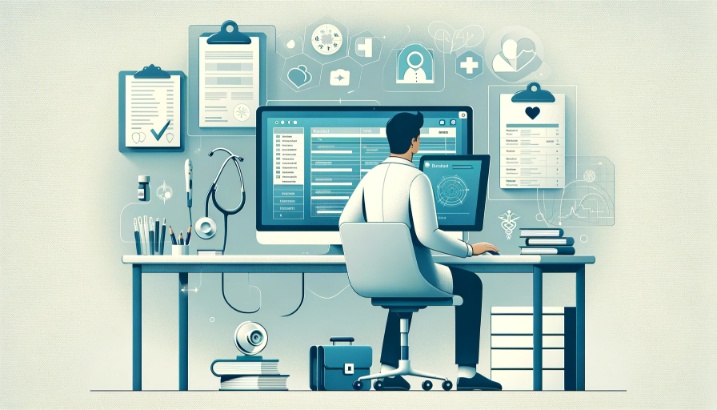Are you curious about what makes medical data entry services reliable? Imagine a reliable medical data entry service as a well-oiled machine, seamlessly processing and organizing crucial information for healthcare providers. These services offer key features that ensure accuracy, efficiency, and security. Customizable templates allow for tailored data entry forms, making it easier to capture relevant patient information. Integration with existing systems ensures seamless data transfer and eliminates the need for manual input.
These services can effectively extract data from various sources by utilizing OCR technology, reducing errors and saving time. Data encryption safeguards sensitive patient data, ensuring confidentiality. Compliance with HIPAA regulations guarantees that patient privacy is protected. Lastly, real-time data entry allows immediate access to updated information, enhancing decision-making and patient care.
Customizable Templates
When choosing reliable medical data entry services, you can benefit from customizable templates that streamline the process. These templates are designed to meet the specific needs of medical professionals and organizations, allowing for efficient and accurate data entry. Customizable designs ensure that the templates can be tailored to suit your unique requirements, making inputting and managing medical data easier.
With a user-friendly interface, these customizable templates make data entry a breeze. They are designed to be intuitive and easy to navigate, minimizing the chances of errors and ensuring data accuracy. The user-friendly interface allows you to access the necessary fields and input information without hassle quickly.
Additionally, these templates offer a range of features that further enhance the data entry process. You can customize the layout, format, and fields to match your specific workflow, making it easier to input data and retrieve it when needed. The customizable designs also allow for easy integration with other systems, such as electronic health records, ensuring seamless data flow and continuity of care.
Integration With Existing Systems
When it comes to reliable medical data entry services, integration with existing systems is crucial. This feature benefits system compatibility, allowing for seamless data transfer between different platforms. By integrating with existing systems, healthcare providers can ensure that their data entry processes are efficient, accurate, and compatible with their existing infrastructure.
System Compatibility Benefits
To ensure seamless integration with your existing systems, reliable medical data entry services should be compatible with your system’s requirements and specifications. Here are some system compatibility benefits that you can expect from such services:
- Efficient Workflow: The data entry service should integrate smoothly with your existing systems, allowing for streamlined and efficient workflow processes.
- Reduced Errors: By integrating with your systems, the data entry service can minimize manual data entry errors, ensuring accurate and reliable information.
- Cost Savings: With system compatibility, you can avoid additional hardware or software investments, resulting in cost savings for your organization.
- Ease of Use: The service should be user-friendly and intuitive, making it easy for your staff to adapt to the new system.
- Data Security: By integrating with your existing systems, the data entry service can ensure the security and privacy of sensitive medical information.
Seamless Data Transfer
Ensure smooth integration of your medical data entry services with your existing systems by facilitating seamless data transfer. Seamless data transfer is crucial in ensuring your automated processes are efficient and reliable. By integrating your medical data entry services with your existing systems, you can streamline the flow of information and eliminate the need for manual data entry, reducing the chances of errors and saving valuable time. Additionally, seamless data transfer ensures that your sensitive medical data remains secure. Data security is of utmost importance in the healthcare industry, and by implementing seamless data transfer, you can ensure that your patient’s confidential information is protected at all times. With seamless integration and secure data transfer, you can enhance the efficiency and reliability of your medical data entry services.
OCR Technology
Regarding OCR technology in medical data entry services, accuracy is paramount. OCR, or optical character recognition, technology ensures that the data extracted from medical documents is transcribed correctly, minimizing errors and reducing the risk of misinformation. Additionally, OCR technology saves time by automating the data entry process, allowing medical professionals to focus on more critical tasks.
Accuracy of OCR
Achieving high accuracy rates is crucial for reliable medical data entry services, and one key factor in achieving this is the utilization of OCR technology. OCR, or Optical Character Recognition, is a technology that converts scanned documents or images into editable and searchable data. When it comes to the accuracy of OCR, there are certain limitations to be aware of, such as the potential for errors in recognizing handwritten or poor-quality text. However, there are alternatives to OCR, such as manual data entry or intelligent data capture systems, which can be used to ensure accuracy in medical data entry. By implementing OCR technology or its alternatives, medical data entry services can improve data accuracy and reduce the chances of errors. This accuracy is essential for ensuring patient safety and providing reliable healthcare services. In the subsequent section, let’s explore the time-saving benefits of utilizing OCR technology.
Time-Saving Benefits
By utilizing OCR technology, you can significantly save time in reliable medical data entry services. OCR, or Optical Character Recognition, automates converting scanned documents or images into editable text. This technology eliminates the need for manual data entry, improving efficiency and accuracy in medical data management. With OCR, you can quickly extract meaningful information from medical records, prescriptions, and other documents, reducing the time it takes to input data into electronic health records or other systems. This automated process saves time and reduces the risk of errors that can occur during manual data entry. Healthcare professionals can focus more on patient care and other critical tasks by streamlining the data entry process with OCR technology. Now, let’s move on to the next section about data encryption, which ensures medical data security.
Data Encryption
A critical feature of reliable medical data entry services is ensuring your data is encrypted. Data security and privacy are paramount in the healthcare industry, and encrypting your medical data provides additional protection against unauthorized access. Here are five critical aspects of data encryption in medical data entry services:
- Secure transmission: Encryption ensures that your data is protected during transmission from one system to another, minimizing the risk of interception or data breaches.
- Data at rest protection: With encryption, your data remains encrypted even when stored in databases or servers, safeguarding it from unauthorized access if the storage media is compromised.
- Access control: Encryption allows for controlled access to encrypted data, ensuring only authorized individuals can decrypt and view sensitive information.
- Compliance with regulations: Encrypting medical data helps organizations meet regulatory requirements, such as HIPAA, which mandates the protection of patient information.
- Data integrity: Encryption algorithms can also provide integrity checks to ensure that data has not been tampered with or altered.
HIPAA Compliance
To ensure the security and privacy of your medical data, it is crucial to adhere to HIPAA compliance requirements. HIPAA, which stands for the Health Insurance Portability and Accountability Act, sets forth regulations that safeguard patient information and ensure its confidentiality. These regulations are essential in the healthcare industry, protecting sensitive data from unauthorized access, use, or disclosure.
HIPAA compliance involves implementing various measures to ensure data security. It requires healthcare organizations to establish and maintain physical, administrative, and technical safeguards to protect electronic protected health information (ePHI). These safeguards include secure access controls, encryption, and regular risk assessments to identify and address potential vulnerabilities.
One of the critical aspects of HIPAA compliance is the implementation of strict data security policies and procedures. This includes training employees on the importance of data security, promoting awareness about potential security risks, and monitoring and auditing systems to detect any breaches or violations.
By adhering to HIPAA compliance, medical data entry services can guarantee the confidentiality and integrity of your medical data. They can ensure that all data entry processes are conducted securely and compliant, minimizing the risk of data breaches and unauthorized access.
Real-Time Data Entry
As you continue to prioritize HIPAA compliance in your medical data entry services, exploring the benefits of real-time data entry is essential. Real-time updates and data validation ensure accurate and efficient data entry processes. Here are five key benefits of real-time data entry:
- Immediate access to updated information: Real-time data entry allows you to access the most recent patient information, ensuring you have the latest data at your fingertips.
- Timely decision-making: With real-time updates, healthcare providers can make informed decisions promptly, leading to improved patient care and outcomes.
- Enhanced accuracy: Real-time data entry enables immediate data validation, reducing the likelihood of errors and ensuring that the information entered is accurate.
- Improved efficiency: Real-time data entry eliminates the need for manual data synchronization or batch updates, saving time and effort for healthcare providers.
- Streamlined workflows: By entering data in real-time, you can streamline your workflows and improve overall operational efficiency.
Real-time data entry offers significant advantages regarding access to updated information, timely decision-making, enhanced accuracy, improved efficiency, and streamlined workflows. By adopting real-time data entry practices, you can ensure that your medical data entry services are reliable and efficient, benefiting healthcare providers and patients.
Frequently Asked Questions
How Can Customizable Templates Improve the Efficiency of Medical Data Entry Services?
Customizable forms can significantly improve the efficiency of medical data entry services by allowing you to create templates tailored to your specific needs. This automation benefit saves time and ensures accuracy in the entry process.
What Are the Benefits of Integrating Medical Data Entry Services With Existing Systems?
Integrating medical data entry services with your existing systems has numerous benefits. It improves system efficiency, streamlines workflows, reduces errors, and enhances data accuracy. Experience the advantages of seamless integration today.
How Does the Use of OCR Technology in Medical Data Entry Services Help in Reducing Errors?
Using OCR technology in medical data entry services helps reduce errors by accurately scanning and digitizing documents. It ensures efficient data entry, minimizing the risk of human error and improving overall data accuracy.
What Are the Different Methods Used for Data Encryption in Reliable Medical Data Entry Services?
To ensure data security and accuracy in reliable medical data entry services, various methods of data encryption are used. These methods help protect sensitive information and prevent unauthorized access or tampering.
Can You Provide an Overview of the Key Elements of HIPAA Compliance in Medical Data Entry Services?
You need to ensure HIPAA compliance in your medical data entry services. Implement security measures like encryption, access controls, and regular audits to protect patient information and maintain confidentiality.




